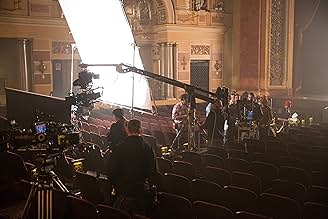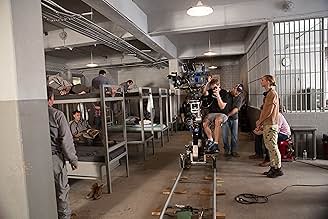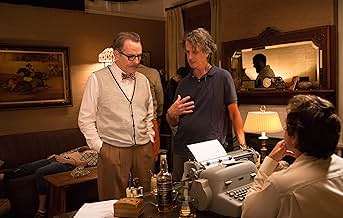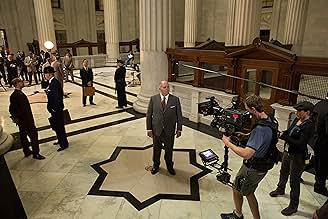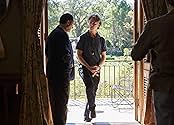VALUTAZIONE IMDb
7,4/10
86.535
LA TUA VALUTAZIONE
Nel 1947, Dalton Trumbo fu il miglior sceneggiatore di Hollywood, fino a quando lui e altri artisti furono incarcerati e inseriti nella lista nera per le loro convinzioni politiche.Nel 1947, Dalton Trumbo fu il miglior sceneggiatore di Hollywood, fino a quando lui e altri artisti furono incarcerati e inseriti nella lista nera per le loro convinzioni politiche.Nel 1947, Dalton Trumbo fu il miglior sceneggiatore di Hollywood, fino a quando lui e altri artisti furono incarcerati e inseriti nella lista nera per le loro convinzioni politiche.
- Regia
- Sceneggiatura
- Star
- Candidato a 1 Oscar
- 8 vittorie e 45 candidature totali
Toby Nichols
- Chris Trumbo (age 6-10)
- (as Tobias McDowell Nichols)
Recensioni in evidenza
I've seen some mixed reviews of Trumbo, and in a way I can understand why it wouldn't impress some film critics. It is a movie where the movie business, and especially movie personalities, are given over to actors to play. It's not unlike a few years ago with the Anthony Hopkins Hitchcock: you got a big cast and they all have roles to play from people who, if you're a big movie buff (or even someone who just knows who Kirk Douglas or John Wayne were, and that's probably a lot, whether or not you know who Dalton Trumbo was entirely), there's an aspect of 'Oh, he's or she is playing HIM or HER!' But I think with a sharp enough script that sort of thing goes by the way-side, especially if it gives the right actors some good stuff to play. There's nothing about Trumbo that is especially complex, as it has the message that most of us in 2015 would agree with: the Hollywood Blacklist, not just what happened to the Hollywood 10 but many others, was a horrible thing, and the thesis comes down to the idea that there were good and bad people in it but it also came down to the nature of it all making people victims... well, except for Hedda Hopper.
The movie is fun though whether or not you know a lot about the history because of who is in the cast and especially Bryan Cranston as Trumbo. He's a man who makes a lot of money in the 40's in Hollywood writing scripts and yet is an avowed Communist (he makes the case to his daughter in such a way early on in the film that some might question but most of us would go 'huh, that's it then'). A lot of the conflict comes because of what the history had right there: HUAC went after people in Hollywood who were suspected 'traitors', but in reality were just writers and (some) actors and directors who had affiliations with the party, and thanks to pressure by columnist Hedda Hopper (played here by Helen Mirren in a role that's deliciously evil) and John Wayne (actor I can't remember but does a good impression without being caricature-ish), a group got pressured. They didn't name names, were held in contempt of court, found guilty and did time. Well, unless if you were Edward G. Robinson (though he's shown in a somewhat sympathetic light, maybe just by Michael Stuhlbarg being in the role).
The bulk of the story is about the 'front' that Trumbo led for himself and other blacklisted writers such as stubborn/cancer-ridden Arlen Hird (Louis CK, always a pleasure to watch, but especially in scenes with Cranston). They used fake names to get their scripts made, even as they had no choice for a while but to team up with filmmakers who were out to just make "crap" (an echo in a way for me of Burton's Ed Wood with the John Goodman character). There's some predictable drama that unfolds - the all-business-all-writing part of Dalton that conflicts with being a father and family-man and clashing with his daughter and wife (very good Elle Fanning and Diane Lane respectively) - but what helps it along all the way is just a sharp script and direction that keeps things thematically strong.
This is serious stuff what happened to these people in Hollywood, and director Jay Roach and writer John McNamara know that, all the way up to a final speech from Trumbo upon winning a WGA award that puts things into a perspective that (almost) makes Trumbo too fair to those who really wronged him and his friends. But it's just full of wit an clever lines; if you're a sucker for that, as I can be sometimes, then Trumbo makes for a balance of the light and dark stuff. Again if nothing else, Cranston makes someone who can easily be seen as a CHARACTER in bold letters (and by many accounts that is who Trumbo was) and gives him three dimensions and perspective on the situations that unfold. He does things that may be wrong and provocative, in both bad and good ways, and is told off enough that any of his short-comings become kind of charming. I could've spent more time with his Trumbo and been happy, especially in light of the history that unfolds here (i.e. Roman Holiday, Spatacus, Exodus, other productions like The Brave One).
The movie is fun though whether or not you know a lot about the history because of who is in the cast and especially Bryan Cranston as Trumbo. He's a man who makes a lot of money in the 40's in Hollywood writing scripts and yet is an avowed Communist (he makes the case to his daughter in such a way early on in the film that some might question but most of us would go 'huh, that's it then'). A lot of the conflict comes because of what the history had right there: HUAC went after people in Hollywood who were suspected 'traitors', but in reality were just writers and (some) actors and directors who had affiliations with the party, and thanks to pressure by columnist Hedda Hopper (played here by Helen Mirren in a role that's deliciously evil) and John Wayne (actor I can't remember but does a good impression without being caricature-ish), a group got pressured. They didn't name names, were held in contempt of court, found guilty and did time. Well, unless if you were Edward G. Robinson (though he's shown in a somewhat sympathetic light, maybe just by Michael Stuhlbarg being in the role).
The bulk of the story is about the 'front' that Trumbo led for himself and other blacklisted writers such as stubborn/cancer-ridden Arlen Hird (Louis CK, always a pleasure to watch, but especially in scenes with Cranston). They used fake names to get their scripts made, even as they had no choice for a while but to team up with filmmakers who were out to just make "crap" (an echo in a way for me of Burton's Ed Wood with the John Goodman character). There's some predictable drama that unfolds - the all-business-all-writing part of Dalton that conflicts with being a father and family-man and clashing with his daughter and wife (very good Elle Fanning and Diane Lane respectively) - but what helps it along all the way is just a sharp script and direction that keeps things thematically strong.
This is serious stuff what happened to these people in Hollywood, and director Jay Roach and writer John McNamara know that, all the way up to a final speech from Trumbo upon winning a WGA award that puts things into a perspective that (almost) makes Trumbo too fair to those who really wronged him and his friends. But it's just full of wit an clever lines; if you're a sucker for that, as I can be sometimes, then Trumbo makes for a balance of the light and dark stuff. Again if nothing else, Cranston makes someone who can easily be seen as a CHARACTER in bold letters (and by many accounts that is who Trumbo was) and gives him three dimensions and perspective on the situations that unfold. He does things that may be wrong and provocative, in both bad and good ways, and is told off enough that any of his short-comings become kind of charming. I could've spent more time with his Trumbo and been happy, especially in light of the history that unfolds here (i.e. Roman Holiday, Spatacus, Exodus, other productions like The Brave One).
9vsks
After practically having the frequently shown previews for Trumbo memorized, I finally saw the film itself. (Though one trailer scene with Helen Mirren didn't actually appear in the movie. Weird.) As you undoubtedly know, Trumbo is the story of the Hollywood 10, writers blacklisted during the communist witch-hunts of the late 1940s and 1950s. Joe McCarthy and all that. When called before the House Un-American Activities Committee, Dalton Trumbo (played beautifully by Bryan Cranston) and the other nine refused to give Congress information about their beliefs or to rat out others in the film industry. As a result, a number of them including Trumbo went to prison for contempt of Congress ("I AM contemptuous of Congress," he said after the HUAC hearing). He was in the slammer for 10 months and once he was out could no longer get work. Meanwhile, some industry personages—in the movie, producer Buddy Ross (Roger Bart) and actor Edward G. Robinson (Michael Stuhlbarg)—saw their careers going up in smoke and did testify (though in real life, Robinson did not name names). The movie effectively skewers that Great American Flag-Waving Hero, John Wayne, who managed to avoid any military service during World War II and Korea. "If you're going to act as if you won the war single-handedly," Trumbo tells him, "it would be more believable if you'd actually served," as he and so many of his black-listed colleagues had. They represent the tip of the iceberg of people harmed by the virulent anti-Communism of the day, and although the movie is about the Hollywood 10, it's really about the Hollywood One, Trumbo, the most accomplished of the lot. The composite character Arlen Hird has the unenviable job of being Trumbo's verbal sparring partner and representing an amalgam of several of the harder-line writers' views. Trumbo is unfailingly supportive of him, even though he inserts his political views into scripts (which Trumbo rewrites) and clearly doesn't trust Trumbo. (This is where the "You talk like a radical, but you live like a rich man" line from the trailer fits in.) While not a lot of acting was required of Diane Lane as Trumbo's wife, she did a fine job, and Helen Mirren is perfect as the odious Hedda Hopper, blackmailer without portfolio. As writer Hird, comedian Louis C.K.'s acting inexperience shows a bit, as he's up against such acting superstars, while John Goodman is all prickly geniality and Alan Tudyk plays a credible Ian McLellan Hunter. Hunter wins the Academy Award for the Roman Holiday script (the Gregory Peck, Audrey Hepburn classic), but Trumbo wrote it. In fact, Trumbo and the others write many screenplays for which they receive credit only belatedly, if at all. The back of the blacklist can't be broken until a few Hollywood luminaries are willing to give appropriate screen credit. Directed by Jay Roach with a solid script from John McNamara. While in their vision, the character of Trumbo doesn't change much over the course of the story—except perhaps to learn not to take what he most cherishes for granted—"he is no more or less principled at the end than he was at the start," said Anthony Lane in The New Yorker. He is forgiving, though, and in the end acknowledges that all humans are a mix of good acts and bad (except perhaps for Hedda Hopper). The real opportunity for learning lies with the audience. While those anti-Communist days may now seem rather quaint—Congress taking on a bunch of two-fingered typists—there always are people who believe they know best what other people should think, who believe others are too dim or inattentive to grasp hidden political messages, who think citizens are like children who have to be protected from difficult ideas. That, the movie Trumbo seems to say, is still the danger. Another film well worth the price of a ticket.
I have seen so many documentaries about this era. The Hollywood blacklist, McCarthyism.
However, this takes a fresh, personal look at what happened. It shows how folks actually handled this, rather than just the circumstances of the time and newsreels of Congress hearings. How did they do it? This shows the how and when, the risks. Of course, Trumbo captures the full story of the persecution.
Stay to the very end of the film, stay for the credits as some of the clips they show are so meaningful.
I don't know if Trumbo was the person shown in the film, but if he was, he was an American hero. I think films like this represent the spirit, the best or worst of the spirit of what happened.
Trumbo wasn't just a hero from the look of it, he was also a survivor who made his way through the worst of it and came out on the other side.
However, this takes a fresh, personal look at what happened. It shows how folks actually handled this, rather than just the circumstances of the time and newsreels of Congress hearings. How did they do it? This shows the how and when, the risks. Of course, Trumbo captures the full story of the persecution.
Stay to the very end of the film, stay for the credits as some of the clips they show are so meaningful.
I don't know if Trumbo was the person shown in the film, but if he was, he was an American hero. I think films like this represent the spirit, the best or worst of the spirit of what happened.
Trumbo wasn't just a hero from the look of it, he was also a survivor who made his way through the worst of it and came out on the other side.
I give this movie an 8 out of 10. I think, technically, it deserves a 6 or 7. It hinges on the modern notion that a biopic isn't complete unless we see all the nuances regarding the protagonist's family life. That is not necessarily the fault of the filmmakers. I don't think a picture can get funded if it doesn't adhere to these modern foibles. I give it an 8, however, and, for its purpose alone, it deserves a 10.
It takes guts to make a movie like this today.
In the United States, we tend to get comfortable and forget that the concept of freedom of speech is the most important idea any human being has ever put forth. We tend to forget that the powers that be don't like that idea.
They really, REALLY don't like that idea.
They want us lowly masses to be good little sheep and do what we're told and think exactly the way they want us to think. We tend to forget that fighting against that tendency of power is a struggle, a painful, sometimes lethal struggle. Folks in other countries know about it. They know all too well. That's why, in spite of all the other problems they may have with the U.S., they still want to live here.
But we've gotten lazy. Not only are there forces on the extreme right that would like to dictate how we live, think, and even breathe--now we have a warring faction from the left, seen most prominently on college campuses, that embraces censorship and the "shutting down" of alternative opinions like little McCarthys on methamphetamine. The concept of a "safe space," where no "offensive" opinions may be heard, is nothing short of censorship. Defenders of this nonsense often make the claim that the government is not getting involved, therefore, it's not a violation of the First Amendment. Here's what's wrong with that argument:
1. Remember our old friend Katherine Hepburn in Adam's Rib? In her closing arguments, she says the law has two parts--the letter and the spirit. It's true, by the letter of the law, students harassing and banning speakers on campus they don't agree with does not equal the federal government censoring those speakers. But it does violate the SPIRIT of the First Amendment. The government, as the film Trumbo clearly shows, cannot always be trusted to safeguard the LETTER of that particular law. It is up to us, We the People, to safeguard the SPIRIT of that law.
2. Trumbo shows us the horrific world where the government trampled on the First Amendment from the top down. What is happening on college campuses today is that violators of what is deemed "politically correct" (a phrase originating from Mao's Cultural Revolution, which should raise several alarms on that basis alone) are subjected to kangaroo courts on the campus, away from legitimate, LEGAL courts of law. They are harassed and humiliated (just as dissenters in the Cultural Revolution were) with no legal recourse. If this practice becomes accepted in normal society, we will have a political environment no different from the times depicted in the film. The only difference--this time, it we have started with the people and spread to a government ready and willing to enact "speech codes" for its own purposes.
By now, those who still, stubbornly, cling to the notion that there is nothing wrong with what is happening on college campuses today will have dismissed this review. They might even leave typical ad hominem attacks on the message boards to make what attempts they can to silence me (to kill the messenger, if you will). This should very well indicate that what I've said is true.
The sane people reading this, no doubt, are asking what the heck this all has to do with Trumbo.
Answer:
Everything.
Having been subjected to a kangaroo court on a college campus where I was called in to the Title IX office for teaching Vonnegut's "Harrison Bergeron," I couldn't help but think, as I watched Trumbo, of the horrific witch hunt I was subjected to. That the film so easily earned my empathy is a testament to how well it's made.
I wish everyone involved a long, healthy career in the movies. We need more stories like this, stories that remind us the struggle to survive as individuals in a world that so stubbornly clings to collectivism is a never-ending battle. It's happened before. It's happening now. If we don't speak up and resist, it will continue happening in the future.
It takes guts to make a movie like this today.
In the United States, we tend to get comfortable and forget that the concept of freedom of speech is the most important idea any human being has ever put forth. We tend to forget that the powers that be don't like that idea.
They really, REALLY don't like that idea.
They want us lowly masses to be good little sheep and do what we're told and think exactly the way they want us to think. We tend to forget that fighting against that tendency of power is a struggle, a painful, sometimes lethal struggle. Folks in other countries know about it. They know all too well. That's why, in spite of all the other problems they may have with the U.S., they still want to live here.
But we've gotten lazy. Not only are there forces on the extreme right that would like to dictate how we live, think, and even breathe--now we have a warring faction from the left, seen most prominently on college campuses, that embraces censorship and the "shutting down" of alternative opinions like little McCarthys on methamphetamine. The concept of a "safe space," where no "offensive" opinions may be heard, is nothing short of censorship. Defenders of this nonsense often make the claim that the government is not getting involved, therefore, it's not a violation of the First Amendment. Here's what's wrong with that argument:
1. Remember our old friend Katherine Hepburn in Adam's Rib? In her closing arguments, she says the law has two parts--the letter and the spirit. It's true, by the letter of the law, students harassing and banning speakers on campus they don't agree with does not equal the federal government censoring those speakers. But it does violate the SPIRIT of the First Amendment. The government, as the film Trumbo clearly shows, cannot always be trusted to safeguard the LETTER of that particular law. It is up to us, We the People, to safeguard the SPIRIT of that law.
2. Trumbo shows us the horrific world where the government trampled on the First Amendment from the top down. What is happening on college campuses today is that violators of what is deemed "politically correct" (a phrase originating from Mao's Cultural Revolution, which should raise several alarms on that basis alone) are subjected to kangaroo courts on the campus, away from legitimate, LEGAL courts of law. They are harassed and humiliated (just as dissenters in the Cultural Revolution were) with no legal recourse. If this practice becomes accepted in normal society, we will have a political environment no different from the times depicted in the film. The only difference--this time, it we have started with the people and spread to a government ready and willing to enact "speech codes" for its own purposes.
By now, those who still, stubbornly, cling to the notion that there is nothing wrong with what is happening on college campuses today will have dismissed this review. They might even leave typical ad hominem attacks on the message boards to make what attempts they can to silence me (to kill the messenger, if you will). This should very well indicate that what I've said is true.
The sane people reading this, no doubt, are asking what the heck this all has to do with Trumbo.
Answer:
Everything.
Having been subjected to a kangaroo court on a college campus where I was called in to the Title IX office for teaching Vonnegut's "Harrison Bergeron," I couldn't help but think, as I watched Trumbo, of the horrific witch hunt I was subjected to. That the film so easily earned my empathy is a testament to how well it's made.
I wish everyone involved a long, healthy career in the movies. We need more stories like this, stories that remind us the struggle to survive as individuals in a world that so stubbornly clings to collectivism is a never-ending battle. It's happened before. It's happening now. If we don't speak up and resist, it will continue happening in the future.
This movie is important. It tells the story of the struggles faced by the people who sought to have a differing political view in the 1950s and 60s. Their decision to think differently left them facing prejudice and hatred in America. This is the focus of this movie.
The story follow Dalton Trumbo, portrayed by Brian Cranston,a successful screenwriter in Hollywood in the 1950s. Cranston carries this movie on the shoulders of his performance. It is truly phenomenal how he brings such life and energy to this character. He captured my attention anytime he was on-screen and is without a doubt one of the major reasons you should see this movie.If you are a fan of any of Cranstons previous works you should love this movie for that reason alone. Cranston was nominated for an Oscar for this performance, a nomination I believe was well deserved.
The movie is of course based on a true story. while I cannot attest to the validity of the facts, I can confidently say that anyone interested in this period of history will find this movie much more enjoyable then reading a Wikipedia page.
Overall I give Trumbo 8/10 for its compelling plot and excellent performances. i would highly recommend it.
The story follow Dalton Trumbo, portrayed by Brian Cranston,a successful screenwriter in Hollywood in the 1950s. Cranston carries this movie on the shoulders of his performance. It is truly phenomenal how he brings such life and energy to this character. He captured my attention anytime he was on-screen and is without a doubt one of the major reasons you should see this movie.If you are a fan of any of Cranstons previous works you should love this movie for that reason alone. Cranston was nominated for an Oscar for this performance, a nomination I believe was well deserved.
The movie is of course based on a true story. while I cannot attest to the validity of the facts, I can confidently say that anyone interested in this period of history will find this movie much more enjoyable then reading a Wikipedia page.
Overall I give Trumbo 8/10 for its compelling plot and excellent performances. i would highly recommend it.
Lo sapevi?
- QuizBryan Cranston revealed in a radio interview that Kirk Douglas approved of this movie, but his major complaint was that he wasn't asked to play himself.
- BlooperWhen the Oscar is presented for Best Screenplay at the 1954 Awards the presenter says, "And the Oscar goes to..." This phrase was not used by presenters until the 61st Academy Awards in 1989. In the 1950s the presenter would have said, "And the winner is..." when presenting an Oscar.
- Citazioni
Dalton Trumbo: Friends? What friends? Who the hell has the luxury of friends? I've got allies and enemies. There's no room for anything else.
- Curiosità sui creditiAs the credit scroll begins, photos of Dalton Trumbo, his family, and other people portrayed in the film are shown. These are followed by historical footage of Trumbo giving an interview (from the same one where he acknowledges that he is 'Robert Rich').
- Versioni alternativeThe version of the movie that has been screened on Indian theaters and telecast in India is a PG-13 level cut that has been rated UA by the CBFC.
I più visti
Accedi per valutare e creare un elenco di titoli salvati per ottenere consigli personalizzati
Dettagli
Botteghino
- Budget
- 15.000.000 USD (previsto)
- Lordo Stati Uniti e Canada
- 7.857.741 USD
- Fine settimana di apertura Stati Uniti e Canada
- 74.177 USD
- 8 nov 2015
- Lordo in tutto il mondo
- 11.430.025 USD
- Tempo di esecuzione
- 2h 4min(124 min)
- Colore
- Mix di suoni
- Proporzioni
- 1.85 : 1
Contribuisci a questa pagina
Suggerisci una modifica o aggiungi i contenuti mancanti








